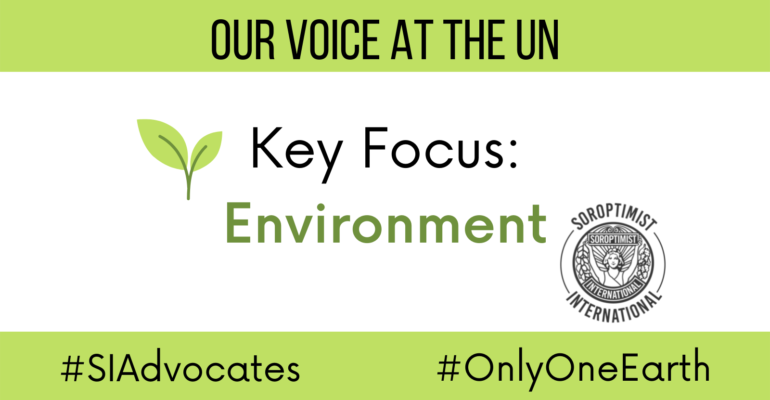This edition focuses on recent developments in environmental and climate change policy.
UN Environment Assembly (UNEA)

Earlier this year, the resumed fifth session of the United Nations Environment Assembly (UNEA-5.2) made history as it delivered multiple landmark resolutions in environmental policy. The most significant moment was the adoption of the resolution to end plastic pollution. It was an exhilarating atmosphere as governments agreed to negotiate an internationally legally binding instrument by 2024 to end plastic pollution. This treaty is expected to address the full lifecycle of plastics, including production, design, and disposal. Most global treaties take up to a decade to negotiate so the agreed deadline of 2024 for drafting this treaty indicates that governments have recognised the need for urgency and are willing to take meaningful action to protect the environment.
UNEA 5 concluded with the adoption of 14 resolutions to reduce pollution, and protect and restore nature worldwide. We are proud to say that SI’s UN Representatives, Mary Muia, Betty Oluoch, and Asha Abdulrahman were active participants in this historic assembly. For those who are keen to learn more about the outcomes of UNEA 5.2, read Betty Oluoch’s report Turning the Tide on Plastic Waste which describes how the negotiations unfolded, and the excitement that was felt as resolutions were agreed.
World Environment Day

Led by the United Nations Environment Programme, and held annually on 5 June since 1974, World Environment Day is the largest global platform for environmental action and is celebrated by millions of people across the world. This year’s theme: #OnlyOneEarth calls for collective, transformative action to celebrate, protect, and restore our planet, and encourages everyone, everywhere to live and act sustainably.
“Only One Earth” was the slogan for the first United Nations Conference on the Human Environment, held in Stockholm in 1972. This was the first such conference to put sustainable development on the global agenda and led to the establishment of World Environment Day. Fifty years later, Sweden is hosting Stockholm+50 from 2 to 3 June, aptly followed by World Environment Day on 5 June.
The UNEP has published an ‘Only One Earth: Practical Guide’ which outlines some of the collective actions that governments, cities, businesses, organisations, and individuals can take to protect and restore our planet.
Stockholm+50 (2-3 June)

Stockholm+50 will be a high-level event dedicated to facilitating multilateralism in tackling the Earth’s triple planetary crisis – climate, nature, and pollution. We hope to see governments work together to accelerate the implementation of the UN Decade of Action to deliver the Sustainable Development Goals, including the 2030 Agenda, Paris Agreement on climate change, and the Post-2020 Global Biodiversity Framework.
While attending the online ‘Event for Stakeholders by Stakeholders on Stockholm+50 with a View to 2030’ (held May 18- 19 2022) SI Director of Advocacy, Leigh Ellwood-Brown contributed key suggestions on content for the Stockholm+50 outcome documents. Click HERE to read Leigh’s blog from this exciting event.
International Day of Biological Diversity

22 May was International Day of Biological Diversity. This year’s slogan was “Building a shared future for all life”. Despite technological advances, humanity remains entirely dependent on healthy and vibrant ecosystems for our water, food, medicines, clothes, fuel, shelter and energy. Biodiversity remains the answer to numerous sustainable development challenges and is the foundation upon which we can build back better.
Despite the value biodiversity provides, it is being degraded at catastrophic rates. Humanity is using the equivalent of 1.6 Earths to maintain our way of life[1] and ecosystems cannot keep up. Shielding endangered habitats and species is no longer enough to halt the rapid loss of biodiversity; restoration programmes must be urgently introduced. As part of the decade on ecosystem restoration, the United Nation’s has produced ten principles. These best-practice principles detail the essential tenets of ecosystem restoration that should be followed to maximise net gain for native biodiversity, ecosystem health and integrity, and human health and well-being, across all biomes, sectors and regions[2].
[2] https://www.decadeonrestoration.org/publications/principles-ecosystem-restoration-guide-united-nations-decade-2021-2030
Environmental Crime
 This week, SI signed the NGO Statement to the 31st Session of the Commission on Crime Prevention and Criminal Justice (Vienna, Austria, 16-20 May 2022), ‘Strengthening the International Legal Framework and International Cooperation in the Context of Crimes that Affect the Environment‘
This week, SI signed the NGO Statement to the 31st Session of the Commission on Crime Prevention and Criminal Justice (Vienna, Austria, 16-20 May 2022), ‘Strengthening the International Legal Framework and International Cooperation in the Context of Crimes that Affect the Environment‘
For more information on where we stand on climate change, read our Position Paper on Climate Change.

